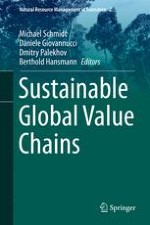2019 | OriginalPaper | Chapter
38. A Paradigm Shift in University Education Towards Sustainable Development
Authors : Dmitry Palekhov, Ludmila Palekhova, Michael Schmidt, Berthold Hansmann
Published in: Sustainable Global Value Chains
Publisher: Springer International Publishing
Activate our intelligent search to find suitable subject content or patents.
Select sections of text to find matching patents with Artificial Intelligence. powered by
Select sections of text to find additional relevant content using AI-assisted search. powered by
